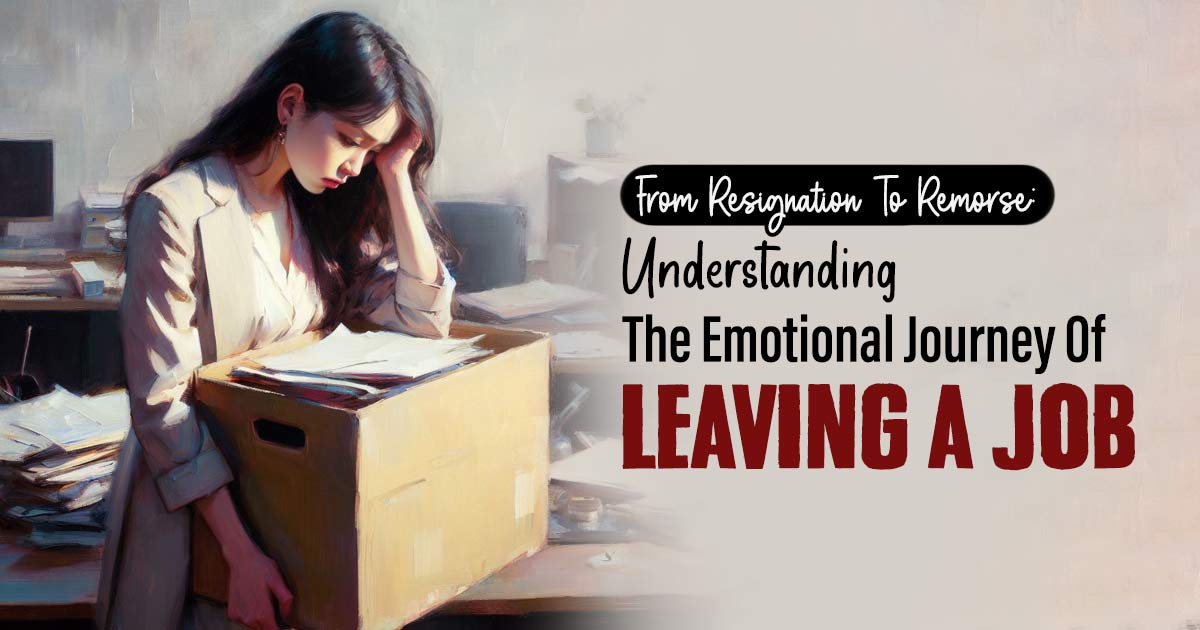To leave a job, position or responsibility is to suffer from ‘resigner’s remorse’. This is something that often happens when one leaves a familiar and comfortable situation but with some doubts. If the resignation is forced upon someone, as it may be in situations like forced resignations or if the person feels pushed out by personal or professional problems, then regret can be very strong.
Signs Of Resigner’s Remorse
The common signs of resigner’s remorse include:
1. Sadness and loss:
When someone is going through resigner’s remorse, he/she often feels sadness and a sense of loss, especially if one had a good rapport with the job or had built great relationships with colleagues. Such people find it empty in their life after leaving such a role and have challenges to deal with the changes that come with exiting their position.
2. Anxiety and uncertainty:
Resigning from one’s work or position can be accompanied by anxiety as well as uncertainty about the future. People may get worried about finding another job, blending into new surroundings or financial constraints. The consequence is stress being aggravated and a decision to quit brings about restiveness.
3. Self-doubt and questioning:
Individuals with resigners’ remorse will second-guess their resolution, and question whether it is a good one. In this case, even their proficiency will come into question; hence, there will be concerns about whether they will make it in the forthcoming undertakings. This doubt becomes paralyzing for them since it affects both their morale and self-esteem.
4. Difficulty letting go:
Employees with resigner’s remorse may face problems when trying to detach themselves from particular roles, duties as well as contacts which they used to have before quitting the firm or business enterprise. They may still be tied to old routines and places emotionally since they would not easily fit into new environments.
5. Isolation and disconnection:
People with resigner’s remorse often feel isolated or disconnected from those people he or she has been working together with and has left behind him/her at work while resigning from the job. The breakdown in once-strong interpersonal relationships with co-workers may also result in a sense of lost identity or an out-of-touch experience.
Tips For Dealing With Resigner’s Remorse
Consider the following tips for dealing with resigner’s remorse:
1. Grieve:
When you have resigner’s remorse, it is important to give yourself time to grieve. This may include shedding tears or feeling pain in your chest as you acknowledge what you are losing. Mourning the loss associated with your prior position and accepting change in relation to it is normal. Talking to friends family or a therapist. Should you need someone to hold your palm, cry on, utter some word or even offer guidance.
2. Think about possibilities that lie ahead:
Even though you may be worried about what is going to happen next, try thinking about future opportunities more instead of dwelling in the past. Begin by setting new objectives and ambitions for yourself, exploring other career paths which you might wish to pursue or considering going back to school again. Planning for tomorrow will give meaning to life and allow one navigate.
3. Maintain contact:
Stay in touch with your ex-colleagues as well as former managers and mentors. You can rely on them for guidance, ideas or even just chat with them sometimes. By networking and maintaining professional relationships, one can avoid being completely isolated after quitting their job.
4. Take care of yourself:
Perform self-care tasks that help maintain good mental and emotional health like physical activity; meditation; writing down personal experiences; spending quality time with loved ones among others…. Taking care of oneself both physically as well as emotionally aids in overcoming the challenges of resigner’s remorse hence becoming stronger.
5. Look out for new things:
Embrace this opportunity to experience different things and go places where other people haven’t been before. Search out other jobs, consider being an independent contractor or think about starting one’s own business(es). Through searching for new jobs that one will purposefully endeavor into, he/she will be able to recapture his/her enthusiasm thereby becoming satisfied thereafter. After quitting a job, it’s normal to feel regretful and doubtful about this step.
Nevertheless, it should be noted that life would be incomplete without changes and we should take these opportunities as they come. Instead of crying over spilt milk; let us think about the new beginnings that lie ahead of us. It is alright to lose something but people should learn to adjust with whatever comes their way in a positive way. In conclusion, resigner’s remorse can be considered as an ephemeral emotion opening other new possibilities.




























